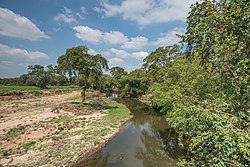Malwathu Oya
| Malwathu Oya Aruvi Aru | |
|---|---|
 Malwathu River in Anuradhapura | |
| Native name | මල්වතු ඔය (Sinhala) |
| Location | |
| Country | Sri Lanka |
| Physical characteristics | |
| Source | Inamaluwa Mountains |
| • location | Matale and Anuradhapura Districts |
| Mouth | Palk Strait |
• location | Mannar, Northern Province |
• coordinates | 08°48′08″N 79°55′40″E / 8.80222°N 79.92778°E |
| Length | 164 km (102 mi) |
The Malwathu Oya (Template:Lang-si Malwathu Oya, Template:Lang-ta Aruvi Aru), at 164 km (102 mi) long, is the second longest river in Sri Lanka. The river originates in the North Central Province of Sri Lanka and enters the sea on the northwest coast, into the Gulf of Mannar, near Vankalai.[1] It is a seasonal river that spans over 164 kilometers through paddy and forest lands, which are used by the inhabitants to cultivate for their survival.[2][3]
The river basin covers an area of 3,284 km2 (1,268 sq mi) (with a length of 125 km (78 mi), a maximum width of 40 km (25 mi) at an average height of 85.5 m (281 ft) above sea level). The average annual rainfall in the basin area is 1,223 mm (48.1 in). The Ritigala mountain range, which comprises four main peaks (the highest of which is over 900 m (3,000 ft) high), in the upper reaches of the river, serves as the main catchment.
Tributaries
- Kanadara Oya
- Maminiya Oya
- Kadahatu Oya
- Kal Aru
- Narivili Aru
See also
References
- ^ Sykes, Jim (2018). The Musical Gift: Sonic Generosity in Post-War Sri Lanka. Oxford University Press. p. 74. ISBN 9780190912031.
- ^ Perera, PA Chintaka T.; Sundarabarathy, Thenmoli V.; Sivananthawerl, Thavananthan; Kodithuwakku, Suranga P.; Edirisinghe, Udeni (1 December 2016). "Arsenic and Cadmium Contamination in Water, Sediments and Fish is a Consequence of Paddy Cultivation: Evidence of River Pollution in Sri Lanka". Achievements in the Life Sciences. 10 (2): 144–160. doi:10.1016/j.als.2016.11.002. ISSN 2078-1520.
- ^ P.A.C.T. Perera, T.V. Sundarabarathy, T. Sivananthawerl, U. EdirisingheSeasonal variation of water quality parameters in different geomorphic channels of the upper Malwathu Oya in Anuradhapura, Sri LankaTrop. Agric. Res., 25 (2014), pp. 158-170

